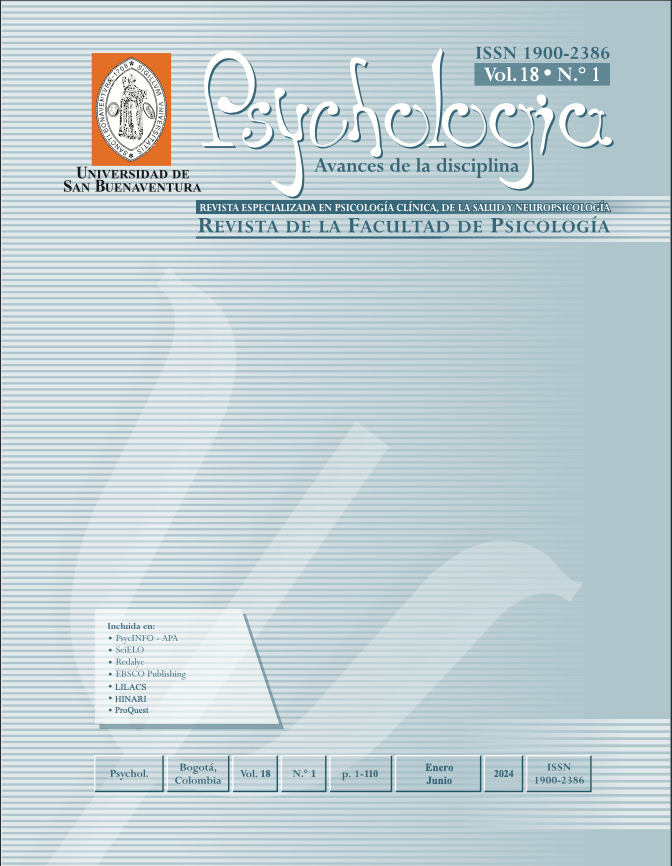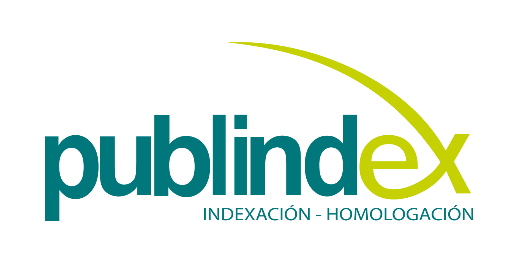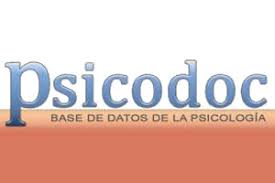This journal provides open, immediate access to its contents, based on the principle that offering the public free access to research helps to promote a higher global exchange of knowledge.
As such, all journal articles are published under a Creative Commons Attribution-NonCommercial-ShareAlike 4.0 International License (CC BY-NC-SA), by which commercial use of the original work or its possible derived works is not allowed, and the distribution thereof must be done with the same license elements regulating the original work.
http://creativecommons.org/licenses/by-nc-sa/4.0/
Abstract
Pathological gambling is a serious problem affecting the entire population, especially the youngest, considering the university population the least studied. The general objective of this study was to characterize gambling dependence and online betting on students of the Pontificia Bolivariana University, Bucaramanga sectional, as well as identify the sociodemographic variables and presence of dependence on gambling in the population studied. The methodology used in this study was a quantitative approach of non-experimental type, a cross-sectional and descriptive design, with a non-probabilistic type of sampling. The participation of 366 adult undergraduate and graduate students was obtained. The instruments used were the Pathological Gambling Brief Questionnaire (CBJP), the Colombian version of the South Oaks Gambling Screen (SOGS) and a questionnaire of sociodemographic data. The data analysis was done through the SPSS version 27 software. Among the results, it is highlighted that, of the 366 participants, 110 of these bets online, and approximately 30% have possible pathological gambling according to CBJP, with the SOGS it is shown that 31,8% are probable pathological players; There is a higher prevalence of online gambling and betting in men, it’s highlighted that most women have no problems with gambling, on the contrary, in men, there’s a prevalence in some problems with gambling.
References
Avendaño, A., Moya, D. y Ferreira, C. (2014). Rasgos ludopáticos en estudiantes de la Universidad Cooperativa de Colombia de octavo semestre del programa de Psicología sede Arauca [Tesis de Pregrado, Universidad Cooperativa de Colombia]. https://repository.ucc.edu.co/server/api/core/bitstreams/58c2e4a8-1966-4db1-b9a4-5711418eaafc/content
Castilla, C., Berdullas, S., Vicente, A. y Villamarín, S. (2013). Apuestas online: el nuevo desafío del juego patológico. Infocop, 61, 3-6. https://www.cop.es/infocop/pdf/2200.pdf
Ceballos, G., Barliza, L., Villafane, Y., Herazo, E., Oviedo, H. y Campo, A. (2013). Cuestionario breve para juego patológico: desempeño psicométrico en universitarios. Revista Ciencias Biomédicas, 4(2), 242-246. https://revistas.unicartagena.edu.co/index.php/cbiomedicas/article/view/2815/2361
Chan, E., Ruiz, J., Morales, L. y Echeburúa, E. (2019). Creencias sobre los juegos de azar y síntomas de juego patológico: propiedades psicométricas y prevalencia en estudiantes mexicanos. Revista Mexicana de Psicología, 36(2), 147-159. https://www.redalyc.org/journal/2430/243067142005/243067142005.pdf
Echeburúa, E., Báez, C., Fernández-Montalvo, J. y Páez, D. (1994). Cuestionario de juego patológico de South Oaks (SOGS): Validación Española. Análisis y Modificación de Conducta, 20(74), 770-791. https://dialnet.unirioja.es/descarga/articulo/7075624.pdf
El Informe Belmont. (1979). Principios y guías éticos para la protección de los sujetos humanos de investigación. http://www.bioeticayderecho.ub.edu/archivos/norm/informebelmont.pdf
Fernández, J., Echeburúa, E. y Báez, C. (1995). El Cuestionario Breve de Juego Patológico (CBJP): Un nuevo instrumento de screening. Análisis y Modificación de Conducta, 21(76), 211-223. https://dialnet.unirioja.es/descarga/articulo/7073730.pdf
Håkansonn, A. (2020). Changes in gambling behavior during the COVID-19 pandemic - a web survey study in Sweden. International Journal of Environment Research and Public Health, 17(11). https://doi.org/10.3390/ijerph17114013
Hernández, R. y Mendoza, C. (2018). Metodología de la Investigación. Las rutas cuantitativa, cualitativa y mixta. McGraw Hill Education.
Lesieur, H. y Blume, S. (1987). The South Oaks Gambling Screen (SOGS): A new instrument for the identification of pathological gamblers. American Journal of Psychiatry, 144, 1184-1188. https://doi.org/10.1176/ajp.144.9.1184
Ley 1581 de 2012. Por la cual se dictan disposiciones generales para la protección de datos personales. 17 de octubre de 2012. D. O. No. 48587.
Ley 1753 de 2015. Por la cual se expide el Plan Nacional de Desarrollo 2014-2018 “Todos por un nuevo país”. 9 de junio de 2015. D. O. No. 49538.
López, I., León, L. y Ibáñez, A. (2020). Actualización del perfil del jugador patológico. Revista de Investigación y Educación en Ciencias de la Salud RIECS, 5(1), 42-29. https://doi.org/10.37536/RIECS.2020.5.1.209
Martínez, R. (2014). Prevalencia de juego patológico en estudiantes universitarios [Tesis de grado, Universidad Autónoma de Nuevo León]. http://eprints.uanl.mx/7798/1/1080259479.pdf
Martínez, K., Agost, M. y Martin, L. (2019). Prevalencia de juego patológico en población universitaria de la Comunidad Valenciana, España. Revista del Hospital Psiquiátrico de La Habana, 16(2), 15-31. https://www.medigraphic.com/pdfs/revhospsihab/hph-2019/hph192b.pdf
Resolución 8430 de 1993 [Ministerio de Salud Nacional]. Por la cual se establecen las normas científicas, técnicas y administrativas para la investigación en salud. 4 de octubre de 1993.
Ruiz, J. (2014). Juego patológico y dependencia del alcohol en una muestra de trabajadores y estudiantes universitarios: prevalencias, interrelaciones y diferencias de género. Psychologia: avances de la disciplina, 8(1), 33-42. http://www.scielo.org.co/pdf/psych/v8n1/v8n1a04.pdf
Ruiz-Pérez, J. y Echeburúa-Odriozola, E. (2017). Cuestionario breve de juego patológico en estudiantes colombianos: propiedades psicométricas. Universitas Psychologica, 16(3). http://dx.doi.org/10.11144/Javeriana.upsy16-3.cbjp
Sussman, S. y Arnett, J, (2014). Emerging adulthood: developmental period facilitative of the addictions. Evaluation & the Health Professions, 37(2), 147-155. https://doi.org/10.1177/0163278714521812
Universidad Pontificia Bolivariana. (21 de mayo de 2021). Políticas de Tratamiento de Información y Protección de los Datos Personales. https://www.upb.edu.co/es/politica-de-privacidad-upb#:~:text=El%20tratamiento%20de%20los%20datos
Zapata, M., Torres, Y. y Montoya, L. (2011). Riesgo de juego patológico: factores y trastornos mentales asociados en jóvenes de Medellín – Colombia. Adicciones, 23(1). https://doi.org/10.20882/adicciones.163





















